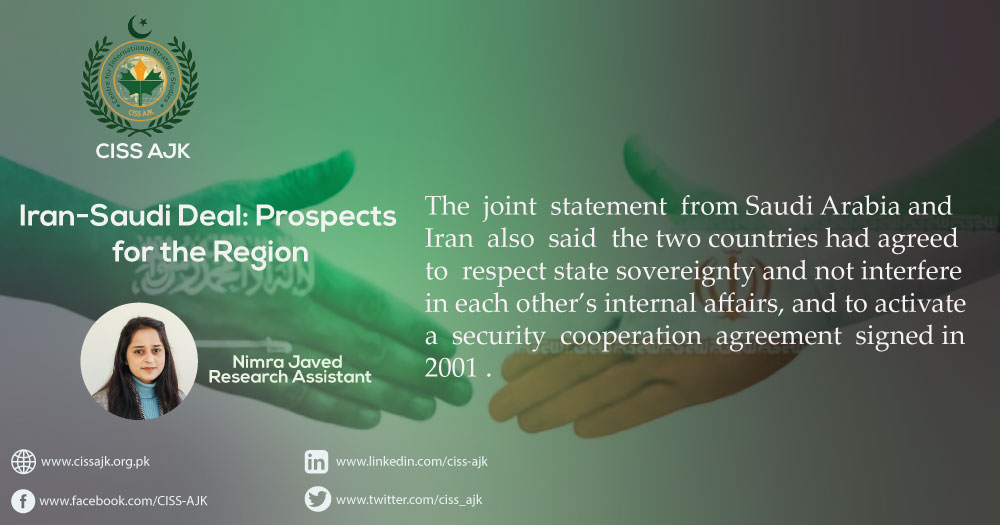623
Iran and Saudi Arabia have agreed to re-establish diplomatic relations and reopen their embassies within two months, according to both Iranian and Saudi state media. This marks a significant development as tensions between the two regional rivals had been high for years, with Riyadh breaking off ties with Tehran in 2016 after protesters invaded Saudi diplomatic posts in Iran following the execution of a prominent Shia Muslim scholar. Despite supporting rival sides in several conflict zones across the Middle East, including in Yemen, where the Houthi rebels are backed by Tehran and Riyadh leads a military coalition supporting the government, both sides have recently sought to improve ties.
The joint statement from Saudi Arabia and Iran also said the two countries had agreed to respect state sovereignty and not interfere in each other’s internal affairs, and to activate a security cooperation agreement signed in 2001. The announcement came on the day President Xi Jinping clinched a third term as China’s president amid a host of challenges. The presence of Beijing’s most senior diplomat, Wang Yi, at the talks signalled China’s interest in bolstering stability and peace in the region, as well as its own legitimacy.
The agreement has been welcomed in Iran, where senior officials have praised it as a step towards reducing tensions and bolstering regional security. However, some conservative media outlets have focused on how the deal signals a “defeat” for the United States and Israel. The US has cautiously welcomed the move, saying that it supports any efforts to help end the war in Yemen and de-escalate tensions in the Middle East region. Iraq and Oman, who had previously helped mediate the talks, greeted the rapprochement with optimism.
Improved relations between Tehran and Riyadh could have an effect on politics across the Middle East, particularly in Lebanon and Syria, where the two countries are on rival sides. This deal could lead to the creation of a better security situation in the region, and political analysts note that reducing tensions in Yemen, Lebanon, Syria, and Iraq can still entail wide-ranging interests for both sides. However, achieving success will require both countries to begin continuous and long-term efforts to try reliable ways that would guarantee mutual interests. While the development of re-establishing diplomatic relations between Iran and Saudi Arabia is considered a significant one for the region, it is important to note that ending the eight-year war in Yemen is still considered by some to be the most important eventual outcome of the agreement.
This will be a difficult goal to achieve, given the high level of distrust and the intensity of geopolitical rivalries, which may render the trend of reducing tensions reversible. Conservative economic dealings with Iran are expected from Saudi Arabia, as it does not want to be exposed to US sanctions, and normalisation does not necessarily mean that the two sides trust each other.
The resumption of diplomatic relations between Iran and Saudi Arabia at both the national and international level is likely to have a significant impact. While it could reduce tensions and lead to improved cooperation in areas such as trade, security, and energy, there are still deep-seated issues that may not be easily resolved. Both countries have supported opposing sides in conflicts throughout the Middle East, and there are religious and geopolitical tensions at play.
Furthermore, the resumption of diplomatic relations may be viewed differently by different segments of society in both countries. At the international level, the agreement could potentially reduce tensions, contribute to stability and peace, and increase China’s influence in the region. It may also have implications for other countries with interests in the Middle East, including the United States and Russia. Ultimately, the impact of the resumption of diplomatic relations between Iran and Saudi Arabia will depend on the actions of both countries going forward and whether they can work towards lasting peace and stability in the region. There is another issue which is vital for the Middle East.
The Director General of the International Atomic Energy Agency (IAEA) visited Iran and met with high-level officials to discuss enhanced cooperation and resolution of outstanding safeguards issues. Both parties agreed to collaborate, address issues related to three locations, and allow for voluntary verification and monitoring activities. Modalities for these activities will be agreed upon in a technical meeting in Tehran, and positive engagements could lead to wider agreements among state parties. This agreement can further help in reducing the tension on the Iran nuclear deal. In conclusion, it is a good deal which can have a long lasting impact on the peace security in the Middle East.

